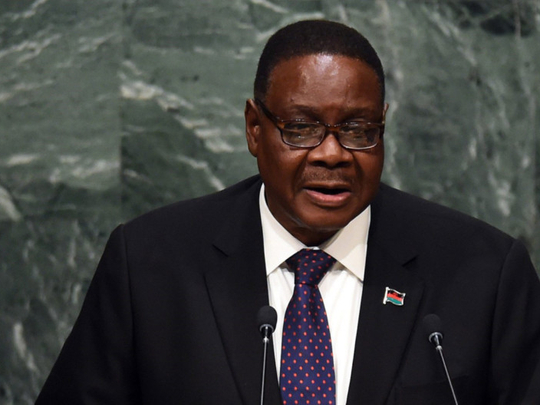
A country of spectacular natural beauty, boasting one of Africa’s Great Lakes, sprawling forests and the mist-laced Shire Highlands, Malawi is a small land-locked country in east Africa. It is rarely in the spotlight and, even then, it’s most likely because of a celebrity sighting: Madonna has adopted four Malawian children and visited most recently to build a paediatric hospital; Prince Harry is a regular, lately volunteering in the relocation of elephants with the NGO African Parks.
Malawi is a regional leader boasting the first elected female vice-president of any African country, and only the second country on the continent to have a female president, Joyce Banda. During Banda’s two-year administration from 2012 to 2014, an imminent economic collapse was averted through the implementation of vital economic reforms, the country’s economic growth rate rose from 1.8 per cent in 2012 to 6.2 per cent in 2014 and draconian laws were repealed, strengthening the rule of law. In health care, the Banda administration promoted safe motherhood initiatives and maternal mortality rates were slashed from 675 per 100,000 live births to 460.
Today, progress has stagnated and the government of President Peter Mutharika is presiding over the country’s sad deterioration. Mutharika’s regime exhibits troubling governance tendencies such as flagrant abuses of the international legal system and political persecution. The principles of democracy, transparency and the rule of law that Banda and her administration re-established during her presidency have been systematically demolished. The case of Banda herself is telling.
The former president was completing a year-long residency earlier this year as a distinguished fellow at the Wilson Center in Washington — before she came to power she was a celebrated civil society advocate — when she publicly announced her intention to return to Malawi. Within days, the national police spokesman James Kadadzera had organised a press conference in which he declared that an arrest warrant had been signed to investigate the former president for “alleged abuse of office and money laundering”. Two months on, neither Banda nor her lawyers have been served a copy of the warrant and all attempts to see it have been thwarted by the authorities.
What Banda had done to receive this treatment was to oversee the exposure of the largest governmental corruption scheme ever uncovered in Malawi. “Cashgate” is reported to have involved $250 million (Dh919.5 million) being stolen from government coffers and British auditors investigating just one six-month period found that tens of millions of dollars had been fraudulently claimed. Neither the audit report nor any other evidence has been produced to implicate Banda, despite wild allegations thrown by her accusers.
However, in threatening what had been a profitable scheme for many, Banda made enemies in the new authoritarian administration that succeeded her. As others have learned to their detriment, in many countries today there is more danger from calling out corruption than there is in engaging in it. Malawi today is characterised by a culture of fear and impunity; the origins of which Banda had sought to expose during her term in office.
Much like what the Russian authorities have repeatedly done against Bill Browder, the Malawian authorities announced they had sent a request to Interpol to prevent Banda from lawfully travelling without being arrested. Browder, who lives in the United Kingdom, has spent the past eight years investigating the murder of Sergei Magnitsky in a Russian prison and calling for sanctions against Russia. He was recently prevented from travelling to the United States because of an Interpol-issued “diffusion notice” instituted at the request of Russian authorities; a process that has come under increasing scrutiny as a tool of political persecution by authoritarian states.
Banda is not only confronted by a politically motivated investigation and the threat of arrest, but has received numerous death threats aimed at her and her family. These threats explicitly warn that if she continues speaking out about political corruption and dares set foot in Malawi, she will be killed.
So while the “ghost warrant” was being contrived to deter Banda from returning home, her sister, Cecilia Kumpukwe, was being arrested in Malawi — accused of online rumour-mongering at the expense of the Vice-President, Saulos Chilima. The allegations remain unsubstantiated, but nonetheless she has to report to the police every Tuesday and her passport has been withdrawn by the government, stranding her in Malawi and preventing travel to South Africa for important medical treatment.
Even more chillingly, Banda’s son has been publicly labelled a “vampire” — a ridiculous, but fatal designation in Malawi, which has seen eight people murdered by lynch mobs in the last month alone, spurred to violence by this pernicious libel.
The treatment of Banda and her family serves as a stark reminder that Malawi must recommit to higher standards of governance and the rule of law or risk failing its citizens and finding itself attracting the wrong sort of headlines. Yet, Malawi is not alone in needing to show proper respect for due process. Recent events across the region and in the West only serve to emphasise the need for deeply rooted institutions with the resilience to withstand those who, in power, might seek to undermine and subvert them for personal and political gain.
— Guardian News & Media Ltd
Cherie Blair is the chair of Omnia Strategy LLP.









